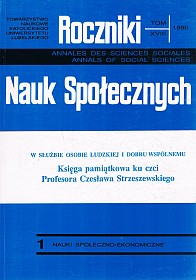Spółdzielnie rolnicze w Polsce w świetle zasad społecznych pomocniczości i solidarności
Abstrakt
The analyses that have been carried out prove that agricultural cooperatives in post-war Poland did not meet the four crucial criteria of the cooperative movement. They were not voluntary associations. They did not give their members shares in the created goods or service which they did. They were not autonomous or self-dependent. Such tendencies occur in the years 1960-1970. Their extent was different in particular kinds of cooperatives. The Communal Cooperatives „Peasants’ Self-Help” were the most apparent example which did not meet the criteria of the authentic cooperative movement. Their development in view of the four characteristics should be estimated negatively. Similarly, Agricultural Cooperatives which were in principle organized as State enterprises and only their name pretended to be a cooperative association. Cooperative banks can be described as half-voluntary and half-obligatory, since they monopolized the credit and bank activity in agriculture, but ultimately only some farmers who did not produce goods on a larger scale, could work as farmers beyond that organization. Agricultural cooperatives after 1956 bore the character of voluntary associations which were limited only as far as the autonomy and self-dependence were concerned.
The horticultural and apiarian cooperatives which acted on the principle of voluntary participation and free market retained the attributes of a cooperative association in the broadest degree, though in their functioning they were also centrally controlled. Since the beginning of the 1980s one could observe some positive tendencies in the development of agricultural cooperatives, i.e. tendencies which aimed at the curbing of the bureaucratic processes, centralization and „nationalization” of the cooperative movement by political and administrative authorities of the totalitarian State. Yet, it was not until the reforms of 1989-1990 that opened up new opportunities for the restoration of the authentic attributes of the cooperative movement.
In the light of the above analyses one can say that the development of the cooperative movement in post-war Poland, including agricultural cooperatives, was not in accord with the principle of auxiliariness or the principle of solidarity, since it deprived cooperatives of their character of voluntary or open association. It did not secure a share in the profits of cooperative organizations for their members, which organizations were owned by voievodship unions and central coopera tives as well as by the State. The cooperatives were transformed into enterprises controlled by a quasi-State bureaucratic administrative apparatus.
It was only the change of the political and economical system in the period of 1989-1990 that created foundation for the restoration of the authentic cooperative movement, including the agricultural cooperative movement.
Copyright (c) 1990 Roczniki Nauk Społecznych

Utwór dostępny jest na licencji Creative Commons Uznanie autorstwa – Użycie niekomercyjne – Bez utworów zależnych 4.0 Międzynarodowe.


